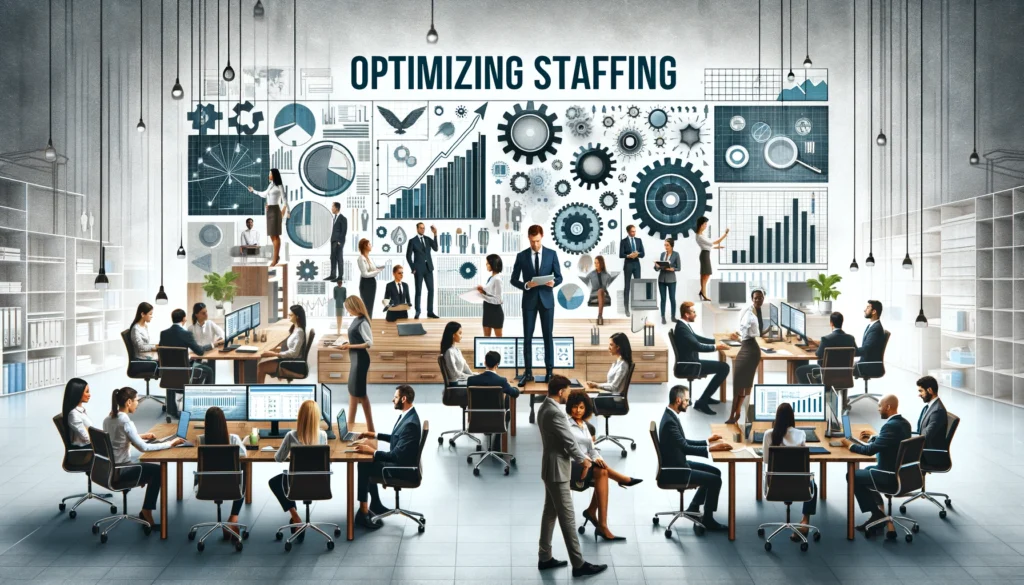The staffing industry is undergoing a significant transformation, thanks to advancements in artificial intelligence (AI) and automation technologies. As businesses strive to find more efficient, accurate, and cost-effective methods to recruit talent, AI and automation are proving to be indispensable tools. The application of these technologies in recruitment processes not only enhances efficiency but also dramatically improves the overall quality of hires.
The Rise of AI in Recruitment
The integration of AI into staffing strategies is not just a trend; it’s reshaping how companies approach talent acquisition. According to LinkedIn’s 2020 Global Talent Trends report, 67% of hiring managers and recruiters reported that AI was saving them time. AI algorithms are adept at parsing vast amounts of data, enabling recruiters to quickly sift through thousands of applications to identify the most promising candidates. This capability is particularly valuable in today’s labor market, where the volume of applications can be overwhelming.
Enhancing Candidate Matching with Machine Learning
Machine learning, a subset of AI, plays a crucial role in improving the candidate-job matching process. By analyzing data from past hiring decisions and outcomes, machine learning models can predict which candidates are likely to succeed in a role, thereby improving the quality of hires. A study by Deloitte revealed that organizations using AI and data-driven analytics for recruitment have seen a 35% reduction in turnover rates, underscoring the effectiveness of technology in making informed hiring decisions.
Streamlining Administrative Tasks Through Automation
Automation in recruitment extends beyond initial candidate screening. It encompasses various stages of the hiring process, including scheduling interviews, sending follow-up emails, and managing databases. Automating these administrative tasks frees up recruiters’ time, allowing them to focus on more strategic aspects of their roles, such as candidate engagement and relationship building. For instance, automated scheduling tools can reduce the time spent coordinating interviews by up to 80%, according to a report from Officevibe.
Improving Speed and Accuracy in Candidate Screening
The speed and accuracy of candidate screening are critical in a competitive job market. AI-powered tools like resume parsers and chatbots can quickly extract relevant information from resumes and interact with candidates in real-time. These technologies not only expedite the screening process but also enhance the accuracy by minimizing human biases. A survey by Harvard Business Review highlighted that 88% of companies reported that AI was a key enabler in removing human bias from their recruitment processes.
Case Study: Transforming Recruitment with AI
Consider the example of a global technology firm that implemented an AI-driven recruitment solution. The firm was able to reduce its time-to-hire by 50% and improve its candidate fit by 45%. The AI system was designed to analyze job descriptions and candidate profiles, providing recommendations based on skills, experience, and potential cultural fit. This not only streamlined the recruitment process but also ensured higher retention rates by matching candidates more closely with job requirements and company culture.
Future Trends and Considerations
As AI and automation continue to evolve, their impact on recruitment is expected to grow. Future trends may include the use of natural language processing (NLP) to analyze job interviews, predictive analytics to forecast hiring needs, and even augmented reality (AR) for virtual job trials. However, it’s important for companies to consider the ethical implications of using AI in recruitment, including privacy concerns and the need to ensure transparency in AI-driven decisions.
Conclusion and Call to Action
AI and automation are revolutionizing recruitment, offering unprecedented opportunities to enhance efficiency, accuracy, and fairness in staffing strategies. As these technologies continue to develop, they promise to unlock even greater potential in the staffing industry.
If your organization is looking to harness the power of AI and automation in recruitment, consider partnering with a technology provider that can offer tailored solutions to meet your specific needs. Embrace the future of hiring and transform your recruitment strategy with cutting-edge technology today.

